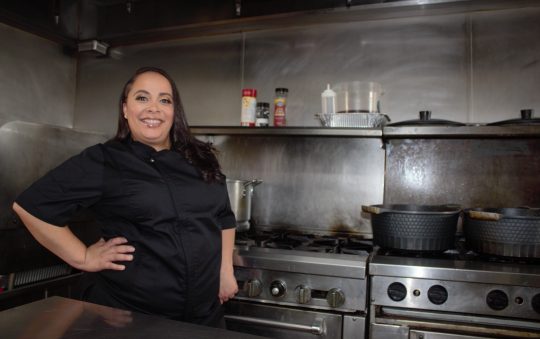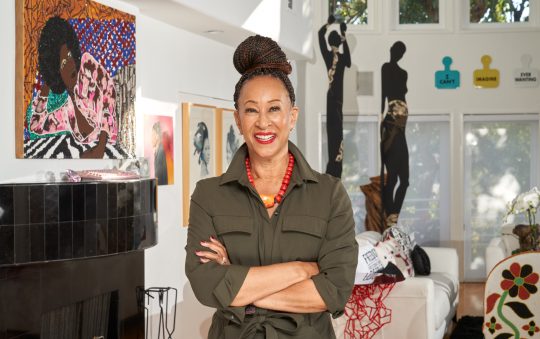
Georgia Rep. John Lewis, the only living “Big Six” leader of the Civil Rights Movement, made a rare appearance in Los Angeles on Jan. 23 at the Los Angeles County Federation of Labor’s Dr. Martin Luther King Labor Breakfast to honor the legacy of Dr. Martin Luther King.
Lewis, 75, was the keynote speaker at the AFL-CIO Town Hall at the Westin Bonaventure Hotel whose theme was “Across the Bridge…to the American Dream.” The theme paid homage to the hundreds of protesters who marched across the infamous Edmund Pettus Bridge in Selma, Alabama in a bid for freedom and equality during the Civil Rights Movement.
The former Chairman of the Student Nonviolent Coordinating Committee (SNCC) and one of the 13 original Freedom Riders reminisced about his participation in the Civil Rights Movement and answered questions from student activists who attended the breakfast from around the city.
The son of sharecroppers, Lewis kept the crowd riveted with his recollections of growing up in the segregated South and of the “separate but equal” laws that kept the races divided.
“When we went to the movies, all of us black children were sent to the balcony upstairs while the white children were seated on the first floor,” Lewis recalled. “I asked my mother, ‘Why?’ and she said, ‘That’s just the way things are.’”

“I remember being 16 years old and we went to the public library trying to get a library card, trying to get books,” Lewis reflected. “The librarian said, ‘This library is for whites only and not for coloreds.’”
Pausing, Lewis added, “I did not go back to that library until 50 years later in 1998 when I had a book signing.”
The actions of seamstress Rosa Parks who refused to give up her seat on a bus in 1955 first stirred the seeds of activism in the young Lewis, but the actions of Dr. Martin Luther King brought his activism to the fore.
“I got in the way, I got in trouble,” Lewis recalled. “I wrote a letter to Dr. King, and he invited us to Montgomery to meet with him.”
Recalling one of the watershed moments in the Civil Rights Movement known as “Bloody Sunday”, Lewis recounted the momentous incident that occurred on March 7, 1965 when he and fellow activist Hosea Williams led over 600 followers across the infamous Edmund Pettus Bridge, named for a former Grand Dragon of the Ku Klux Klan.
The marchers were attempting to march to the Alabama state capital in Montgomery, but they were stopped in their tracks.
“The state troopers said, ‘This march cannot continue, you need to go back to your homes or churches,’” but we did not back down. We began to pray. The troopers advanced and discharged tear gas and they beat us with nightsticks and bull whips. Many of us were left bloody and unconscious. I thought I was going to die,” Lewis reflected.
During the fracas, Lewis’ skull was fractured with a nightstick. He said he still bears the scars on his head today.
“I was arrested 45 times,” Lewis recalled. “I will probably be arrested 45 more times before I leave Congress,” he joked.
The fiery Lewis added that people must continue to protest. “Do you remember those old washing machines that used to be called agitators? We need to continue to agitate,” he declared. “We need to beat some of the dirt and filth out of our country.

“If one of our brothers and sisters is being put down because of race or color, you’d better know that if you beat some of us, you’ll have to beat all of us,” he pointed out. “When you see something that is not right, not fair, not just, you have to speak up.”
Christine Simmons, president and chief operating officer of the L.A. Sparks, and L.A. County Federation Executive Secretary-Treasurer Rusty Hicks moderated the town hall as Congressman Lewis fielded questions from young workers and local students about the most effective ways to pursue activism.
Martha Martin, a high school student at Miguel Contreras Learning Complex, asked Lewis how young people can fight racism and discrimination by using social media.
“In my generation, during the march on Selma and Montgomery, we didn’t even have a fax machine,” Lewis recalled. “You can use social media as a tool to reach hundreds of thousands of people,” he pointed out. “You can organize a whole movement with social media. Do it, just do it,” he urged.
Sesley Lewis, a student California State Los Angeles, president of the Black Student Union and a participant in the Black Lives Matter movement, asked Lewis when it was appropriate to “push” for change and when was it appropriate to compromise.
“I am not going to tell you when you should compromise,” said Lewis. “If you feel in your heart, soul and gut that something isn’t right, speak up. Just do it.”
Pausing, he added, “You must continue to try to educate and sensitize people. Sometimes it takes people a while to catch on, but don’t stop.”
Kimberly Mendoza, a young student worker, queried, “Young workers face a lot of exploitation. Our manager shows us anti-union videos. Our communities suffer from lack of protection. How can we be part of the labor union when we’re caught in dead end jobs?
“Talk to leaders of labor and you will never go wrong,” Lewis urged. “Continue to organize. They say you cannot win, but you will win. Continue to speak out for what is fair and just.”







